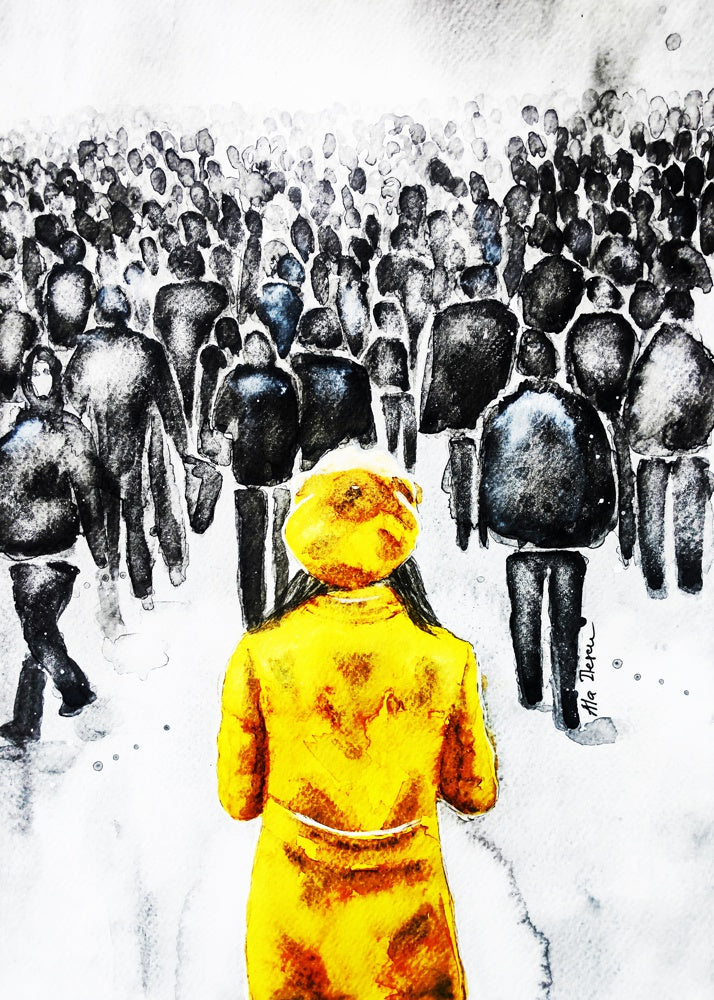TRANSLATED FROM THE BENGALI BY ALOK BISWAS
If god exists man is nothing. If man exists god does not exist (Lucifer and the Lord)
– Jean Paul Sartre
‘Come down, come down, you son of a pig. I’ll flay you alive. If you are really your mother’s child, face me if you dare to come down,’ – the madman was shouting, his eyes fixed in the direction of the sky. Emitting out of the depths of his narrow chest, inflating the veins of his neck, getting past his dirty and sticky throat inside the cavity and touching his haphazardly set teeth, his shrieks rebounded in the sky – ‘Come down, there’s trouble in store for you.’
It was noon. The sun was right at its zenith. No shadow under anybody’s feet. Even if one stood in the blazing sun, there would be no shadow under one’s feet. It was doubtful if we existed at all – if we were really made of mortal substances. But there was no doubt on the mad man’s mind. On one of the hottest days of the year he was shouting himself hoarse. His shrieks lashed clattering at the the emotionless Jaistha’s midday sky – and returned reverberating – ‘Come down, I say. Show your mettle if you dare. Come down, you debda. Come down.’
It did not rain for quite a few weeks. There was not even an iota of moisture’s grace on the sky’s dry, bluish skin. It seemed as though there was not even an atom of vapour in the small floating clouds scattered across the sky. The god of creation and destruction was all in flames. Like poison drops, his blessings were sipping through the pores of the body. Body juices were evaporating. Blood’s density was on the rise. Human beings looked helpless. But the madman was not going to give in all that easily. Beside the busiest road of the city, he had virtually begun his revolt.
Who was he addressing? Why on earth was he addressing? What had actually happened? It was no use looking for answers to these questions. Madmen have no specific target audience. That is why madmen are called mad. But in this case it was not possible to ignore his conduct altogether. One thing could be deciphered from his gaze – his conduct was not merely a case of insanity. It was either an act of purposeful wickedness or an act of saintliness.
Debda, debda, debda – there was earnestness mixed with scorn in this invocation. There was an undertone of belief in it. And that belief was just as meaningful as sceptical disbelief. There are many regions in Bengal, where debota or God is called ‘debda’. Placing a low stool in the yard, people invoked him to descend. Maybe the madman’s shoutings had something to do with that ritual invocation. But even if one is unaware of this, it is quite possible that the invocation could reach one’s ears as ‘debta, debta’. In that case, one might very naturally be led to assume that the madman was trying to say, “Come down – come down, debota. Come down as rain, as a saviour.” A man in distress invariably needs someone to seek help from – “Help, help,” he is expected to cry out. And the one he seeks help from cannot but be a god.
When invoked, the god will show mercy. In gratitude man stoops so low that he sees only the god’s feet but not his head. But the madman was not invoking in a gesture of self surrender, nor was he lying prostrate. On the contrary, standing erect and inflating his chest, the man was demanding what he deserved. How uninhibitedly he called the god son of a pig. Wasn’t he scared of the god in the least? Even a madman knows what is harmful for him. But then what was there for this madman to be scared of?
Yet we feel fear. Did the god understand verbal obscenities in Bengali? If he did, he must have been offended. That could do immense harm to society. We all know it. But we were so well -mannered that we could not muster the courage to stop the madman. In actual fact, obscenities are not a language but just an ugly manifestation of atavistic excitement. The way he was hurling obscenities up at the sky might make the onlookers think as if it were a disowned younger son hurling his long accumulated rancour at his capitalist elder brother,who has misappropriated all their father’s property and lives in a highrise building; he would never forgive his elder brother for such maldistribution of wealth. So he was trying to heal his wounds by uttering obscenities and expletives. Rain was what was badly needed. The parched land cracked loudly in the severe heat; the throat cracked with thirst even more loudly.
The man lacked good manners. He would seek the god’s service and yet he would flay him should the latter descend. What sort of barbarism was that? The god was well aware of the madman’s capacity for beastly trickery- in case he descended the madman would have his wish fulfilled and at the same time he would demonstrate his power by beating the former in public. The god was no fool.
Whatever the madman’s thought, the gods are dangerous to deal with. They remain beyond man’s reach even when he soars as high as he can soar. Not that what was going on down below remained totally unnoticed by the god. So long he did not pay heed to the madman’s words, but when he sensed that the madman was becoming an object of public attention he looked down from his ethereal balcony. The god looked rather happy that he had found a defiantly mighty rival at long last.
A self- satisfied smirk appeared on his face. Leaning against the columns of clouds, the god felt like laughing out loudly at the sight of the madman’s futile endeavour. Ha, ha, ha. But should the god laugh that way his laughter would turn into a flash of lightning and would thus become visible to all. At the assurance of imminent rain, the madman realized his mistake and so the god somehow managed to suppress his laughter.
The madman’s voice lost its vehemence by degrees, his shrieks became more feeble and more feeble. All he could say now was: Come down, come down. Taking the form of the sun, the god was sucking what little energy was left in him. The madman looked pale. But drawing the god’s attention was not so easy. The god did not make an instant response lest he should appear repulsively greedy; he would go on playing his game until the madman gave in. What relentless indifference! What a terrible cruelty! Moreover, the madman’s insolence doubled his inflexibility. All the land’s moisture imperceptibly condensed into clouds. The burden of water vapour made the clouds look like six months pregnant women. There was only one apprehension – if the vapours reached the saturation point, downpour would be inevitable. The entire sky would fall stumbling down upon the earth. However, there was not enough condensation as yet. The melting sunbeams were dripping down the madman’s skin. But he had got dead tired; he was no longer in a position to shout. His body lost its control over itself. His tongue was parched. He tried to spit but there was no saliva on his tongue. There was a measureless emptiness in the tubewell in front of him and in the hollow of his body.
The madman looked helplessly at the sky. Debda, debda, the big brother of all, omniscient, smart, efficient and distinguished. There being no trace of compassion on the god’s face, the madman’s hatred climaxed. He wanted to hurl brickbats at the God. But there was no strength left in him. He let his rancour accumulate inside himself. The more time passed the more his rancour would intensify and the more strength he would gain in his self-declared battle against the god.
The madman looked around. The road was teeming with people moving in a hurry. He knew that they would never side with him. They would never dare to move out of their comfort zone. Yet he would make a last-ditch effort. With this thought in mind, he made grotesque gestures and started grimacing and gnashing his teeth. Twisting his snake-like lithe body, he started romping frenziedly. His romping might as well be called dancing – that was what the spectators thought.
Gradually, the crowd thickened and encircled him. Their jaws dropped open as they kept watching him. He felt encouraged and his creeper-like body glazed. Harnessing all strength he fitfully shouted, his forefinger pointing towards the invisible being. He did not forget to say, ‘Come down, you son of a pig.’ Sometimes, like a victorious gladiator, he raised his arms and flexed his muscles to elicit claps of applause from the spectators.
Seeing his primitive, macabre dance, one man in the crowd remarked jokingly, ‘Break dance’. Another man remarked ‘Bizarre dance.’ But the majority in the crowd , however, had spiritually drugged eyes. There was awe in the eyes of many. Almost the whole crowd agreed, the dance was not merely human; it had some other significance – some purpose, profound and hidden. What is visible does not always reveal the whole truth, does it?
Suddenly some men in the crowd started throwing coins – half-rupee, one-rupee and two-rupee. The coins jingled and clinked. The tiny metal discs fell on the ground and rolled zigzagging only to disappear in the grass.
Presently he got tired and dropped on the ground. He was immobile but did not lose control over his limbs. Almost like a sprinter taking position on his track before the race, he positioned himself, his knees touching the ground and his fingers carrying the weight of the suspended upper part of his body. Bereft of strength in his limbs, he lay sprawling on his back. Looking up at the sky, he began snarling. The spectators looked at each other and stood nonplussed.
The god felt perplexed.
Meanwhile more vapours accumulated. Apprehensive that the clouds might reach the saturation point well before the afternoon, the god felt ruffled. The madman’s seemed to him to be rather mysterious. What exactly was the man up to? What exactly did he want to get by behaving that way? There would be trouble if he somehow he managed to continue his antics till the afternoon. The blazing fire of the god’s wrath grew more intense.
Yet the madman didn’t run out of steam. Throwing his hands and feet about like a child, he kept on fighting. He was somehow trying to bide his time. He was winning the spectators’ support at the same time. If he could hold out for a few hours more, the god would be in real trouble. The sky would darken towards the evening and dreadful silence would prevail in the world. The clouds, which even now looked like grey sooty ones scattered loosely across the blue ceiling of the sky, would bend under the burden of water and start rumbling. Lighting’s teeth would tear the sky to pieces in a moment. The rain would fall. The madman would have his body drenched. The moment he thought about about it, the god started perspiring copiously.
But it was not all that easy to reverse the historical narrative of thousands of years of man’s defeat. The madman’s fretful gesticulations ceased at about 2 in the afternoon. Standing in the severely blazing sun, he felt giddy. He fainted, lockjawed. His entire body fell on the dusty road with a thud. Yet his eyes remained half-open. The crowd shouted – Samadhi – a state of spiritual trance.
His arms and legs were deferentially grasped and his body was laid under the shade of a banyan tree close by. Splitting open the decaying wall of the session judges’ court, the tree jutted out mainly towards the road and cast a circular shade. Its cool shade restored his consciousness. An air of wonderful self-confidence appeared on his countenance. There was equanimity all over his body – a faint smile was seen dangling from his lower lip. Then, raising his arms in a gesture of offering blessings, he assured the thickening crowd.
Such a public leader-like or an ascetic-like deportment left the public flabbergasted. The news spread like forest fire. Having drunk water and eaten several fruits brought by the crowd, he seated himself in a unique posture. No other enlightened being had ever sat in that posture. It seemed as though he was the latest avatar on earth. The sky seemed dreadfully silent. A gentle wind stirred faintly. He directed his gaze towards the sky and the crowd’s gaze followed him. Just at that moment the sky appeared to him to be very brittle and miserable. It seemed as though the god had recoiled in fear of the madman’s whiplash. So the god dare not descend. Distracted with panic, he was losing control of the situation. He would have his back pushed against the wall in a matter of an hour. The denizens on the other side of the sky had never before appeared so timid. It was for nothing that the mortals below had so long been in constant fear of them. The madman gave a smile of contempt.
He seemed to himself like a king of an arid tropical country. Rainlessness was the biggest truth here. Right now rain was not that indispensable. If it was to rain it would rain – not as a gesture of divine compassion but according to the law of nature; the rain would have to fall, willy-nilly.
The moment he got the god in his grip as part of nature’s scheme, he felt the touch of a gust of fresh air. A fragmentary cloudlet covered the blazing face of the sun for a while and passed, giving all present a gentle touch. A few dried leaves of the banyan tree fell on the madman’s body. Two brand new buses of the busiest route went honking melodiously past the site of coronation of the newest king of this land mass. The ‘public’ gave him a rousing ovation. Displaying his dirty teeth to the sky, he sat leaning majestically. His blood cells kept flowing unobstructed through his arteries and veins. His nerves were benumbed.
Presently sleep came upon his eyelids. Everything is unsubstantial in dreams.
(Translated by Alok Biswas)
Follow The Antonym’s Facebook page and Instagram account for more content and exciting updates.




























0 Comments